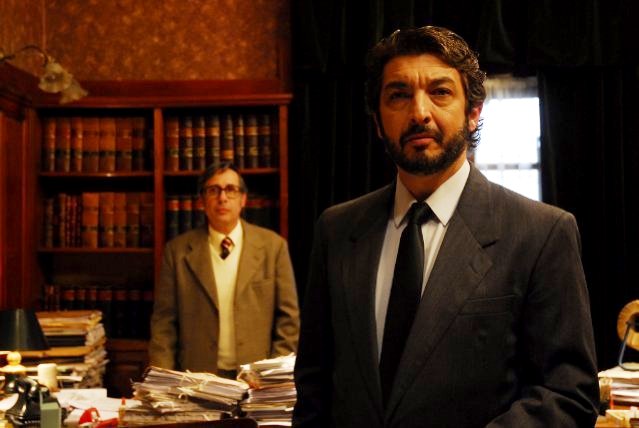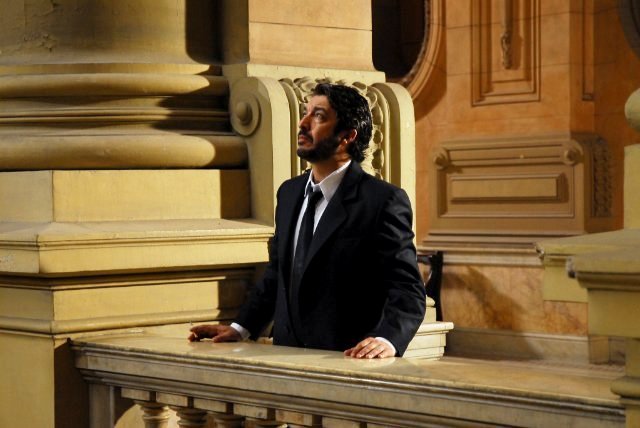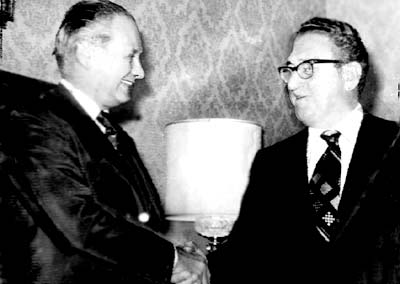
This weekend seems to be the last lull before the summer-movie storm begins in earnest with
Iron Man 2 next Friday. (I
almost talked myself into Samuel Bayer’s
Nightmare on Elm Street remake, out of a fondness for the original, before looking at the reviews and deciding that maintaining my perfect record of never throwing money at
Michael Bay’s Platinum Dunes was a better way to go.) Nonetheless, if you’re in the mood for some quality cinema, I highly recommend a film I saw last weekend, and the 2010 Best Picture winner,
Juan Jose Campanella’s The Secret In Their Eyes (
El secreto de sus ojos.)
At once a police procedural, political thriller, chaste love story, and remembrance of days past, Secret is a hard movie to categorize, but Dana Stevens’ concise summary at Slate — “Imagine a really long, really awesome episode of Law & Order set in Buenos Aires” — is a pretty good start. The thing is, Law & Order in Argentina, particularly ’round the time of the Dirty War, isn’t as black and white as it usually is in our 42-minute visits to the island realm of Jack McCoy and Adam Schiff. In Buenos Aires, as in life, everything gets complicated.
So, how to explain Secret? Well, I was reminded occasionally here of David Fincher’s Zodiac, in that the lingering case at the heart of the story drives some of our characters slightly mad. (The difference being, here an eventual resolution brings little comfort — There are still guilt, complicity, and consequences to contend with.) There’s a bravura sequence in a futbol stadium in the middle going which recalls some of the extended-shot marvels of Alfonse Cuaron’s Children of Men. There’s definitely some of The Wire‘s workingman’s blues and gallows humor here, and and as one of my friends noted, there’s also a good bit of The Remains of the Day in this story too. Taken as a whole, Secret moves to its own unique rhythm, and it is a film that’s definitely worth catching.
The tonal ambiguity of Secret is reflected in the opening moments, as we first meet Benjamin Esposito (Ricardo Darin) — a recently retired ex-lawyer now settling into the writing life — going through the author’s quandary of figuring how to start the book on his brain. First we see and hear that tired romantic cliche, a sad parting at a train station, and a lover chasing down the train. Wait, scratch that. Let’s start with a final breakfast together with the lost lover, and all the details — the honey, the fruit, her floral-print dress, her sun-dappled smile — that can now never be forgotten. No, that’s not it either. So Benjamin falls back to the case file and we witness some brief and dreadful moments in a brutal, bloody rape/homicide. Ugh. That’s no way to start this tale.
Still struggling with his opening chapter, Benjamin visits his old friend and colleague Irene (Soledad Villamil), now a judge in Buenos Aires, who is not particularly enthused to hear that he’s decided to reopen old wounds and write about the tumultuous Morales case. Nonetheless, she gives him an old typewriter (with a broken A) and some excellent advice — Start with what you remember best. And so he does. And soon we find ourselves thirty years in the past, in the small, paper-strewn offices of Ben, Irene, and their semi-functioning alcoholic co-worker Sandoval (Guillermo Francella), just before they pulled the case that transformed their lives.
Particularly by L&O standards, the whodunit aspect of the story is not all that baroque (although it does rely on some potentially clever, potentially dubious po-lice work that helps give the film its name. While I’m on the subject, there’s some implausibly successful good-cop, bad-cop interrogating later on that took me out of the film.) Instead, our investigative trio has much more trouble finding, catching, and holding on to their man after they’ve made him. After all, Argentina between 1976 and 1983 is a slippery place — down is up and up is down, and searching for criminals is no longer a very safe pastime once the criminals are in charge…
I said in my review of Jacques Audiard’s A Prophet that “if The Secret in Their Eyes is better, it must be really something.” And, while I think I ever-so-slightly preferred A Prophet in the end — due to the earlier noted implausibilities here, and because this film’s various acts sometimes feel disconnected from each other– my strong advice is: See them both! A Prophet is a young man’s movie, a coming-of-age, learning-the-ropes story of an ascent into power, while Secret is an older man’s tale, a wistful look back at earlier times and the mistakes, regrets, and chance circumstances that haunted a life. And along with Red Riding, Ellsberg, Terribly Happy, and Kick-Ass, they’re both at the top of my 2010 list so far.








